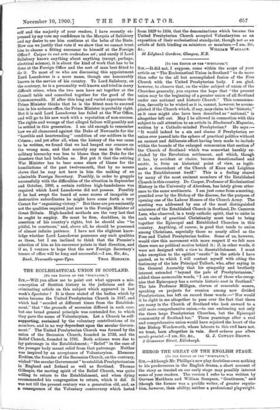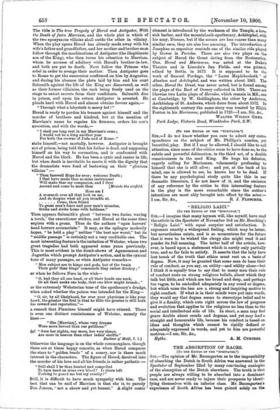HEROD THE GREAT ON THE ENGLISH STAGE.
[To THE EDITOR OP THE "SPECTATOR."] SIR,—Although Mr. Phillips's new play doubtless owes nothing to his predecessors in the English drama, a short account of the story as treated on our early stage may possibly interest some of your readers. The version I refer to was written by Gervase Markham and William Sampson, " Gentlemen," and (though the former was a prolific writer, of greater reputa- tion, however, than ability) neither a professional playwright.
The title is The true Tragedy of Herod and Antipater, With the Death of faire Marriam, and the whole plot is which of the two eponymous villains shall outdo the other in villainy. When the play opens Herod has already made away with his wife's father and grandfather, and her mother andbrother soon follow through the machinations of Antipater (the illegitimate son of the King), who then turns his attention to Marriam, whom he accuses of adultery with Herod's brother-in-law, and both are put to death. Next follow the Princes who rebel in order to avenge their mother. Then Antipater goes to Rome to get the succession confirmed on him by Augustus, and during his absence the plots laid by him and his aunt Salumith against the life of the King are discovered, as well as their former villainies, the rack being freely used on the
stage to extort secrets from their confidants. Salumith dies in prison, and upon his return Antipater is arrested. He pleads hard with Herod and almost obtains favour again,— "Through what a labyrinth is mercy led !"
Herod is ready to pardon his treason against himself and the murder of brothers and kindred, but at the mention of Marriam's name he regains his firmness, orders his son's execution, and with the words,-
` I shall ere long rest in my Marriam's arms; I would not be a king another year
For both the crowns of Jude and of Rome :" stabs himself,—not mortally, however. Antipater is brought out of prison, being told that his father is dead, and supposing himself on his way to coronation, and is confronted with Herod and the block. He has been a cynic and ranter in life, but when death is inevitable he meets it with the dignity that the dramatists were fond of bestowing on their " glorious villains " :—
" Then farewell Hope for ever; welcome Death ; I that have made thee as mine instrument Will make thee my companion, and I thus Ascend and come to meet thee. [Mounts the scaffold.
Here am I A monarch over all that look on me, And do despise what all you tremble at.
Come, thou friend To great men's fears and poor men's miseries, Strike and strike home with boldness."
Then appears Salumith's ghost " between two furies, waving a torch," the executioner strikes, and Herod at the same time expires with a groan. Thus do the authors " upon horrors' head horrors accumulate." It may, as the epilogue modestly hopes, " be held a play " neither " the best nor worst," but its " middle passage " is certainly not a very creditable one. The most interesting feature is the imitation of Webster, whose two great tragedies had both appeared some years previously. This is most evident in the dumb-shows of Agamemnon and Jugurtha which prompt Antipater's action, and in the cynical tone of many passages, as when Antipater remarks- " Men subject are to kings and gods, but of the twain Their gods' than kings' commands they rather disobey ; "
or when he follows Nero in the wish-
" 0, had they all one head, or all their heads one neck,
Or all their necks one body, that one blow might broach ; " or the extremely Websterian tone of the apothecary's drudge, when asked whether the poison was intended for the King-
" 0, sir, by all likelyhood, for ever your physician is like your hawk, the greater the foul is that he kills the greater is still both his reward and reputation,"—
a remark that Flamineo himself might have uttered. There is even one distinct reminiscence of Webster, namely the lines :—
" She [Merriam], whose very dreams
Were more devout than our petitions."
(cf. " Sure her nights, nay more, her very sleeps, Are more in heaven than other ladies' shrifts."
Duchess of MaV, I. 1.) Otherwise the language is on the whole commonplace, though there are at times happy conceits, as when Herod compares the stars to " golden beads " of a rosary, nor is there much interest in the characters. The figure of Herod, deceived into the murder of his love and all his friends, is rather pathetic :—
" Still shall I be thus hunted and compelled
To turn head on mine own blood ? Is there left Nothing to guard me but my cruelty?"
Still, it is difficult to have much sympathy with him. The best that can be said of Merriam is that she is, to parody Ben Jonson, " not a shrew and yet honest." A slight comic element is introduced by the workmen of the Temple, a love. sick barber, and the mountebank-apothecary, Achitophel, with his zany, Disease, but if the scenes are less coarse than many similar ones, they are also less amusing. The introduction of Josephus as expositor reminds one of the similar role played by Gower in Pericles. There are also two plays on the subject of Herod the Great dating from the Restoration. One, Herod and Mariamne, was acted at the Duke's Theatre and in Lincoln's Inn Fields, and was printed, edited by Settle, in 1673. It is supposed to be the work of Samuel Pordage, the " Lame Mephibosheth " of Absalom and Achitophel, and was written about 1661. The other, Herod the Great, was never acted, but is found among the plays of the Earl of Orrery collected in 1694. There are likewise two Latin plays of Herodes, which remain in MS., one at Cambridge, by W. Goldingham, the other by Anderson, Archbishop of St. Andrews, which dates from about 1572. In the eighteenth century the same story was treated by Elijah Fenton in his Mariamne, published in 1723.—I am, Sir, &c.,
WALTER WILSON GREG.
Park Lodge, Victoria Road, Wimbledon Park, S.W.







































 Previous page
Previous page